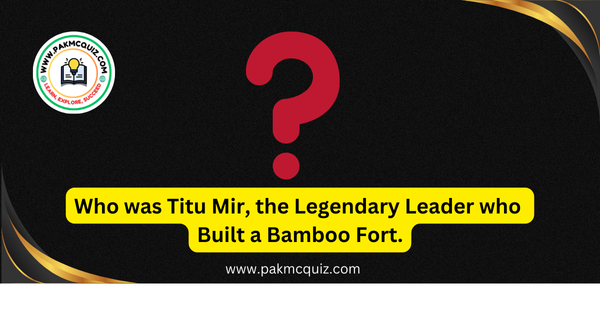Titu Mir Movement Table of Content.
- The Early Life of Titu Mir
- The Movement Led by Titu Mir
- The Bamboo Fort of Titu Mir
- Titu Mir’s Battles and the Defeat of Indigo Planters
- The Death of Titu Mir
- Legacy of Titu Mir
- Conclusion
The Legendary Leader Who Built a Bamboo Fort and Fought Against Colonial Oppression.
Titu Mir, born as Syed Mir Nisar Ali on January 27, 1782, in the village of Chandpur, Bengal (now in Bangladesh), is a name etched in the history of resistance against colonial oppression in India. He is most famously known for leading a movement against the British colonial rulers and the oppressive indigo planters in Bengal during the early 19th century. His legacy is particularly remembered for the iconic bamboo fort, which became a symbol of defiance and resilience.
The Early Life of Titu Mir
Titu Mir was born into a humble family but received a robust religious education, which greatly influenced his worldview. He was an ardent follower of Islamic teachings and was deeply committed to social justice. His early life was marked by a strong sense of responsibility towards his community, and he was known for his leadership qualities from a young age.
The Movement Led by Titu Mir
Titu Mir’s movement was primarily a peasant uprising, aimed at resisting the exploitative practices of the British indigo planters and their local collaborators, the zamindars. The British imposed heavy taxes on the local farmers, forcing them to grow indigo, which was highly profitable for the colonizers but devastating for the local economy. The movement was not only about resisting economic exploitation but also about challenging the cultural and religious impositions by the British and their allies.
The Bamboo Fort of Titu Mir
One of the most iconic aspects of Titu Mir’s movement was the construction of a bamboo fort in Narkelberia, near Calcutta (now Kolkata). This fort became the stronghold of his rebellion. The bamboo fort was not just a physical structure but a symbol of the peasantry’s resilience and their determination to resist oppression. Titu Mir, along with his followers, used this fort as a base to launch attacks against the British forces and the local zamindars who supported them.
Titu Mir’s Battles and the Defeat of Indigo Planters
Titu Mir led several battles against the British forces and their local allies. One of the significant victories of his movement was the defeat of Krishnadeva Rai, a notorious indigo planter, who was known for his harsh treatment of the local farmers. This victory galvanized the local peasantry and attracted more followers to Titu Mir’s cause. However, the British soon recognized the threat posed by this movement and launched a concerted military campaign against him.
The Death of Titu Mir
Despite his early successes, Titu Mir’s movement ultimately faced a brutal crackdown by the British forces. On November 19, 1831, Titu Mir was killed in a battle when the British forces, equipped with superior firepower, attacked the bamboo fort. His death marked the end of the movement, but his legacy continued to inspire future generations of freedom fighters in India.
Legacy of Titu Mir
Titu Mir is remembered as a hero who stood up against colonial oppression and fought for the rights of the peasantry. His movement, though ultimately suppressed, was one of the earliest organized resistances against British rule in India. The bamboo fort of Titu Mir remains a powerful symbol of resilience and defiance, reminding us of the sacrifices made in the struggle for justice and freedom.
Conclusion
Titu Mir’s Bamboo Fort remains a powerful symbol of resistance and struggle, reminding us of the sacrifices made in the struggle for justice and freedom. His life and movement are an important chapter in the history of India’s struggle against colonial rule. His leadership, courage and commitment to justice have left an indelible mark on the memory of his people. Today, Titu Mir is seen not only as a leader of farmers, but also as a symbol of resistance against all forms of oppression. If you are internest in History read more about Petro-Dollar deal…




